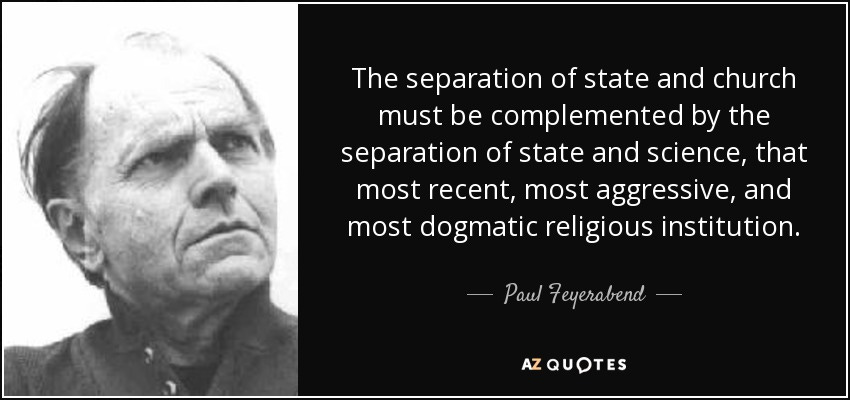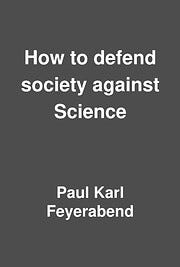Paul K. Feyerabend and ‘The Tyranny of Science’
Science has morphed into a despotic tyranny of anti-reality irrationalism and corporate fascism.
“Heretics in science are still made to suffer from the most severe sanctions this relatively tolerant civilisation has to offer….Science has become rigid, it has ceased to be an instrument of change and liberation…Modern science…inhibits freedom of thought.”
“Science, it seems, is an irresistible force…but only if you believe in the promises….of the science mafia. It is irresistible if you permit it to be so.” (Paul Feyerabend, ‘The Tyranny of Science’ p. 55)
Introduction
Feyerabend died in 1994. He was an Austrian-born ‘philosopher’ of science and an academic. After World War II he fell in with the ‘logical-positivists’ of Vienna, a cult dedicated to rationality and the ‘positive view’ that only ‘science’, logic and reason mattered in life. Metaphysics, immaterial reality, and non-scientific philosophies were to be completely rejected and rubbished. Logical positivism informed various philosophers from Betrand Russell to Richard Dawkins and the new atheists, and it has long been discredited and revealed as a fraud. It is a dry, desiccated and malformed theology of the mind, unable to even define ‘science’ or ‘reason’. Former atheist Antony Flew, who famously converted to deism after spending 10 years studying microbiology and DNA, roundly demolishes logical positivism in his book, ‘There is a God’. Feyerabend also believed in a higher power, dryly and irreverently characterising God as a ‘superior bastard somewhere’.
A flexible approach
Such were the beginnings of the adaptable and changeable Feyerabend. There is no single description of Feyerabend’s philosophy or beliefs. He was subtle and supple critiquing the cult of science and rationality. He admired the ancient Greeks with their vast corpus of innovative philosophical and scientific endeavours. He was fond of recounting the antecedents of modern thought and ‘science’ within the ancient Greek world. From naturalism, atomism, to sophistry and rhetoric, the Greeks had developed the basic ‘tools’ of what we now use. Feyerabend also appeared to be largely ignorant of the medieval world’s contribution to the same, though he heretically eviscerated the Galileo myth, rightly concluding that the better science and methods lay with the Church (pp 49, 53, 111, The Tyranny of Science). I would say Feyerabend was a ‘classical scholar’ marrying the insights of the ancient world to what he saw around him in the modern.
In various positions of academic and professorial privilege, Feyerabend worked with Karl Popper, amongst many other intellectual luminaries. Popper was an acolyte of the ‘logical positivists’ and Feyerabend became one of his most vocal criticasters. In 1962 Feyerabend produced ‘Explanation, Reduction and Empiricism’, about the ‘incommensurability’ or the lack of standards and proofs of scientific papers, directly attacking the cult of the logical-positivists and declaiming that the objective reality of ‘Science’ was a myth, distorted and corrupted as it was by human motives and mendacity.
This paper was deemed blasphemous and unique in 1962, the same year that Thomas Kuhn created his ’The Structure of Scientific Revolutions’, a thesis rejected by Feyerabend as too neat, tidy, and dogmatic in its phraseology, with its ‘natural progression’ of scientific ‘progress’. For Feyerabend, ‘Science’ however defined, was an ‘anything goes’ forum, with no dialectical inevitability and very few if any ‘revolutions’ of ideas. He was largely correct. The myth of Galileo and the 17th century ‘explosion’ in science for example, has always been propaganda espoused by those opposed to the Church, earnestly vilifying all that came before their supposedly ‘enlightened’ age. Galileo et al can trace all their theories and experimental methods back to the 12th century. Shoulders of giants and all that. Let’s not discuss the embarrassing fraud and made-up data of many of these luminaries.
Propositions
In analysing the history of scientific development, which for Feyerabend meant the classical civilisations of the ancient world and the ‘modern’ eras; four general propositions were offered.
Proposition 1: The progress of science depends on an openness of world views which conflicts with the totalitarian pronouncements of many of those defenders.
Proposition 2: World views may take a long time, even centuries before they show results which ‘command attention’ or demonstrate value.
Proposition 3: What demands ‘recognition’ in one community or culture has no impact or importance in another community or culture.
Proposition 4: A world view that contradicts established dogma, for instance religious or metaphysical beliefs, does not clash with ‘rationalism’. (p. 43, The Tyranny of Science)
If we accept these postulates at face value, we can see that ‘The Science’ is anything but scientific and rational. As Feyerabend discusses, there is little ‘openness’ in modern science. Much dogma, for example the incorrect theories of ‘relativity’ and Einstein’s ‘postulates’, may take centuries to be proven false and detrimental. Further, real science should not offend rational common sense, a theme that Feyerabend invokes when discussing scientific theory versus factual evidence.
If common sense and natural observation do not support the dogma being pushed as ‘science’ it stands to ‘reason’ that some people, cultures and communities will reject the ‘science’ as observationally invalid. The only way to impose the ‘new science’ is through force and violence. Feyerabend rightly understood that cultural context, worldviews and proofs were both the enablers and inhibitors of science. ‘The Science’ cannot be trusted with interpretations of what is right, or what is incorrect.
“It is that the sciences are not the last authority on the use of their products, their interpretation included. Questions of reality are too important to be left to scientists (just remember Aristotle’s reaction to Parmenides).” (p. 51, The Tyranny of Science).
‘Science’ and Freedom?
In his books, ‘Science in a Free Society’ and ‘The Tyranny of Science’, Feyerabend outlines his main objections to ‘The Science’. Scientific rationality, he states, now acts as a form of suppression, often inhibiting and silencing any rivals to its narrowly dogmatic worldview. No one can dispute this claim. ‘The Science’ Gestapo and the use of censorship and violence is rife within any of the cults that reside in the Church of ‘Science’. We saw this during the Corona scamdemic, and you see it every day in the fields of ‘climate’, ‘gender’, ‘vaccinations’, cosmology, biology and almost every domain fueled and funded what Feyerabend rightly terms, the ‘science mafia’, dedicated as they are to materialist-philosophies, logical-positivism or extreme rationalism (though almost all of their religious tenets are a-scientific), money and power.
‘Science is just one of the many ideologies that propel society and it should be treated as such... The competence...and the successes of science are vastly exaggerated... The progress of... good science depends on novel ideas and on intellectual freedom... Most scientists today are devoid of ideas, full of fear, intent on producing some paltry result so that they can add to the flood of inane papers that now constitutes “scientific progress” in many areas.’ (Feyerabend, Science in a Free Society).
As Feyerabend viewed it, ‘The Science’ imposes a set of doctrines and procedures administered and institutionalised by ‘experts’ that effectively stifles most if not all criticism, free speech and free investigation. In essence, ‘The Science’ destroys truth and reality becoming authoritarian, with an out-of-control scientific rationalism which threatens our freedom through what Feyerabend calls ‘an unholy alliance of science, rationalism and capitalism’, creating an ‘intellectual fascism’ and crushing all opposition.
Feyerabend was entirely correct in calling ‘The Science’ an intellectual fascism, or as I term it ‘Scientism’. Within any form of fascism there is always a deeply ‘religious’ component meaning not traditional faith, but a faith in materialist theology be it Marxism, Socialism, Communism, or Statism. Fascism is therefore a blend of pagan cult doctrines or beliefs including naturalism and materialism, with corporate and governmental power. Depending on the era and context, fascism will take on different structures and forms, but the overwhelming power of the state and its corporate allies, to manage, mould and manipulate the mass to its materialist-statist objectives, is its defining feature. The ‘Church of Science’ to quote Saint-Simon, or the ‘Church of Reason’ if one prefers the French Revolution’s atavistic atheism.
When we consider Feyerabend’s comments on ‘corporate fascism’ we should admit that the ‘West’ does not have ‘capitalism’ whatever that word might mean. Rather what has transpired is the creation of a corporate-fascism, based on a religion of ‘Science’ itself built on materialist-rationality. This reality is simply a plain fact demonstrated and proven by the Corona plandemic, a recognised verity apparent to anyone with eyes and an average IQ. The ‘drugs-government mafia’ is simply one instantiation of many ‘corporate fascisms’ which dominate Western society. There is never one ‘military-industrial complex’, but an endless array of such configurations across the width and breadth of all economic and social endeavor, a fact expostulated long ago by Eisenhower,. As with all varieties of ‘fascism’, one key objective, witnessed during the Corona medical Nazism, is to eradicate all dissent and disagreement.
‘De-Anthropomorphised’
Where does the ‘tyranny of Science’ lead to? The evisceration of homo sapiens or humanity. Feyerabend termed this ‘de-anthropomorphisation’. The cult of the logical positivists and the church of ‘Science’ leads to the view that nature, chance and materialism inform our reality and can only be explained by ‘The Science’ and ‘experts’ funded by patrons pushing their monotheistic view of ‘Science’.
In this worldview, humans are unimportant and without merit, mere accidents of an impersonal creation in which only the material is important and only that which can be measured, quantified and weighed has any value. In this context, management by ‘wise experts’ employing ‘rationalism’, in a sort of Platonic Republic, is the only ‘reasonable’ governance model. For the record, Plato tried and failed to implement his ‘Republic’ in Italy. None of his inherently contradictory utopian ideals comported with reality or even morality.
“Materialism did not offer any consolation. What it offered at most, was the idea that death was the end of life, not the beginning of, possibly, eternal punishments. Yet it survived, not among the masses, but among small groups of the so-called ‘educated’ until it was safe….What was the origin, the source, the inspiration for an idea which in the end de-anthropomorphised even humans? How did it happen that nature was gradually dehumanised until humans themselves were no longer viewed in a humane way?”
The great crimes of abortion, child castration, gender fascism and androgeneity, ‘euthanasia’, ‘assisted suicide’, coerced ‘vaccinations’, lockdowns and face nappies; along with other state enforced doctrines, obviously highlights a sick, perverted and evil society. Feyerabend answers his own question about how the dehumanisation of humans occurred. It is through ‘Science’ of course, premised on the irrationality of a hyper-‘rationalism’ theology.
“Most popular accounts of science and many philosophical analyses are therefore chimeras, pure and simple. They are as distorted and misleading as a history of art which regards paintings as natural phenomena of a special kind without ever mentioning the individuals lingering in their neighbourhood when they first appear.” (p. 108)
Materialism is one foundation for ‘modern science’. In this worldview, as Feyerabend comments, the great art of a Caravaggio or Raphael appeared by chance, self-forming and constructing. Compare the magnificence of real art with the post-modern or ‘minimalist’. The groaning cement blocks of the modern world towering and grinning above the splendor, craftsmanship and profundity of a cathedral. This is not ‘progress’ nor ‘progressive’.
The second foundation for ‘modern science’ is of course money, or as Feyerabend astutely frames it ‘patronage’. You the ‘scientist’ and ‘expert’ will deliver what the patron wants. It has always been thus. If you are funded by the Church, you will present conclusions that do not offend the religious sensibilities of the patron. If you are funded by the materialist-positivist-rationalist you will offer ‘proofs’ which please and delight so that your future ‘research’ will receive emoluments. The billions that flood ‘research’ and ‘studies’ are evidence that money will derange truth seeking, forcing the recipient into ‘proving’ preordained conclusions and theories. The distortive value of money is almost never discussed in the classrooms or media platforms.
Bottom Line
“..an independent science has long ago been replaced by the business science which lives off society and strengthens its totalitarian tendencies.” (Feyerabend, Science in a Free Society)
Feyerabend should be read simply because he is one of the few ‘intellectuals’ to recognise the reality of ‘Science’ for the ugly, misshapen, disingenuous, corrupted, festering, leprous, totalitarian creature that it is. Feyerabend is correct in proposing that ‘Science’ is an ideology, a religion, married to the unending power of government and its vested interests and partners; indeed a corporate fascism.
‘Science’ is not independent, unified, truthful, truth seeking, or moral. As an ideology, ‘Science’ is riven with conflicts, sects, conceit, money, fraud, disputation, sin, greed, power and fear. Worshipping the false-god and Baal of a supposed monolithic ‘Science’ is not only inane, but immoral. It simply means that the individual human has surrendered critical thinking, independence and rejected the world of the five senses, choosing instead vassalage and knavery to authoritarians and despots.
Feyerabend is correct in predicting that ‘Science’ in its modern material manifestation will lead to the dehumanisation of our species, replaced with a variety of docile, subservient transhumanism. To prevent this future, we need to stop religiously worshipping ‘The Science’ as an objective arbiter of truth, reality and existence, and instead adopt a critical, unbelieving and skeptical posture. Believe nothing. Verify everything. At the very least we need to protect our unique human nature from the overt fascism of a corrupt ‘Scientism’.
=====
Sources, related works
Paul Feyerabend. 1996, 2011, The Tyranny of Science. tinyurl.com/5x479nnz
Paul Feyerabend. Science in a Free Society. tinyurl.com/9vyffmrs
Paul Feyerabend. How to defend society against science. tinyurl.com/yc7ekza9
John Hamer, The Falsification of Science. tinyurl.com/3m6vxxpf; tinyurl.com/yc6fm8mk
Barrie Condon, Science for Heretics. tinyurl.com/3dmrub3u








Thank you for that very interesting article with some very qotable quotes. I will have to read more of Paul K Feyeraband.
very enjoyable reading ----